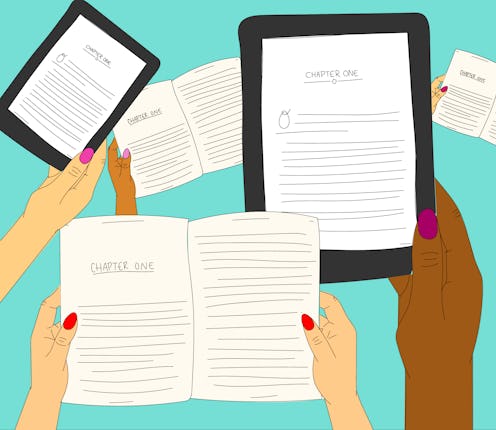Books
7 Ways You Can Support Diverse Books

The reasons for the glaring lack of inclusiveness in the book world are multifaceted. It could be that many readers erroneously believe they "can't relate" to books by and about underrepresented communities. There are also few people of color in editing and decision-making roles in publishing houses, and statistics show that books by and about women and writers of color tend to get fewer reviews in major publications. And these are just a few of the issues at work.
These are big problems that require big solutions. But today the need for diverse books is being declared and fought for more vehemently than ever before, and writers and readers, orgs and even some publishers are answering the call. Organizations like We Need Diverse Books are leading the way for children’s and young adult books, and orgs like VIDA are pushing for recognition of women in literature. Educators are working to diversify school syllabi, and even indie book blogs like Rich In Color and Diversity in YA are promoting books by and about underrepresented people.
But individual readers can be part of the movement, too. Yep, you can do something about diversity in book publishing. You can. You should... and I'm betting that your book-nerdery will drive you to answer the call. Here are few of the things we can all do help make the world of books a little more equal and inclusive.
1. Read more inclusively.
Of course! If you want more diverse books, you’ve got to read the ones that are already out there. Whether you're checking them out from the library, splurging on a hardcover, or downloading it on Audible, your patronage tells publishers, publications, school boards, writers, and even other readers that you want diverse books. Don’t know where to start in diversifying your bookshelf…? Here are some writers of color you should be reading.
2. Diversify your own library.
We all have glaring blind spots in our own educations and perspectives, and those blind spots are probably reflected in your book collection. Happily, the Internet is a thing. If you want to start patching up some of those holes, you can take a look at any number of reading challenges, lists, or Twitter accounts (authors like Daniel José Older and Nnedi Okorafor are pretty active). It will open up your world to new authors and books.
3. Get loud about what you’re reading.
Sure, reading is more of a solitary, quiet activity, but word of mouth is how most readers find their next read. And now, in this world of social media, you can amplify your reach via social media. So snap Instagram photos of your latest bookstore buys, quote excerpts from your current read on Facebook, write reviews on Goodreads, or just tweet a heads up or two when you pick up a new book.
4. Support indie publishers on Kickstarter/Indiegogo.
Despite the lack of diversity in the biggest publishing houses, there are some smaller, independent publishing enterprises that often have a stronger focus on inclusive publishing. In fact, here’s a whole list of small presses run by POC. So, if you want to support diverse books, then keep an eye on the presses you buy from. You should also subscribe to their newsletters (New Directions has a pretty great newsletter), and follow them on social media.
Another great way to find awesome independent publishers is to peruse Kickstarter and Indiegogo. Rosarium Publishing, a minority-owned sci-fi and comics publisher, has a campaign running on Indiegogo right now.
5. Start a book club or reading challenge that focuses on diverse books.
You can diversify you and your friends’ reading lists at the same time with a book club. Not so much into book clubs? Try a personal reading challenge. If you need ideas, tons of organizations and individuals all over the internet have come up with great diversity-themed reading challenges. Or just make up your own, like Sunili Govinnage’s year of reading only non-white authors.
6. Hold a book drive.
When 11-year-old Marley Dias got frustration with the lack of books by and about Black women at her school, she took matters into her own hands and started a “black girl books” book drive. It’s the perfect way to get more diverse books and raise community awareness at the same time. These kids these days, I'm telling you... they're kinda seriously awesome.
7. Support writers!
Despite the oft-cited excuse that "there just aren't a lot of POC/LGBTQ/Disabled/what-have-you writers out there," there actually are. And these writers are working, networking, and supporting each other through scholarships, grants, writers circles, workshops, residencies, independent journals... You name it and writers are doing it. Organizations like VONA host workshops for writers of color and use social media to help writers of color connect with each other and learn about writing opportunities. Small presses like Gertrude Press put out a literary journal that focuses on and celebrates LGBTQA writers and their work. Scholarship programs, like the Jessica Tyner Scholarship which is the only scholarship program for Native American writing and literature students, encourage students to pursue writing careers. Support programs like these by throwing a few dollars their way, showing up to their events, or subscribing to their journal. A little goes a long way... and we've got a long way to go towards making the book business much more inclusive.
Image: Caroline Wurtzel for Bustle